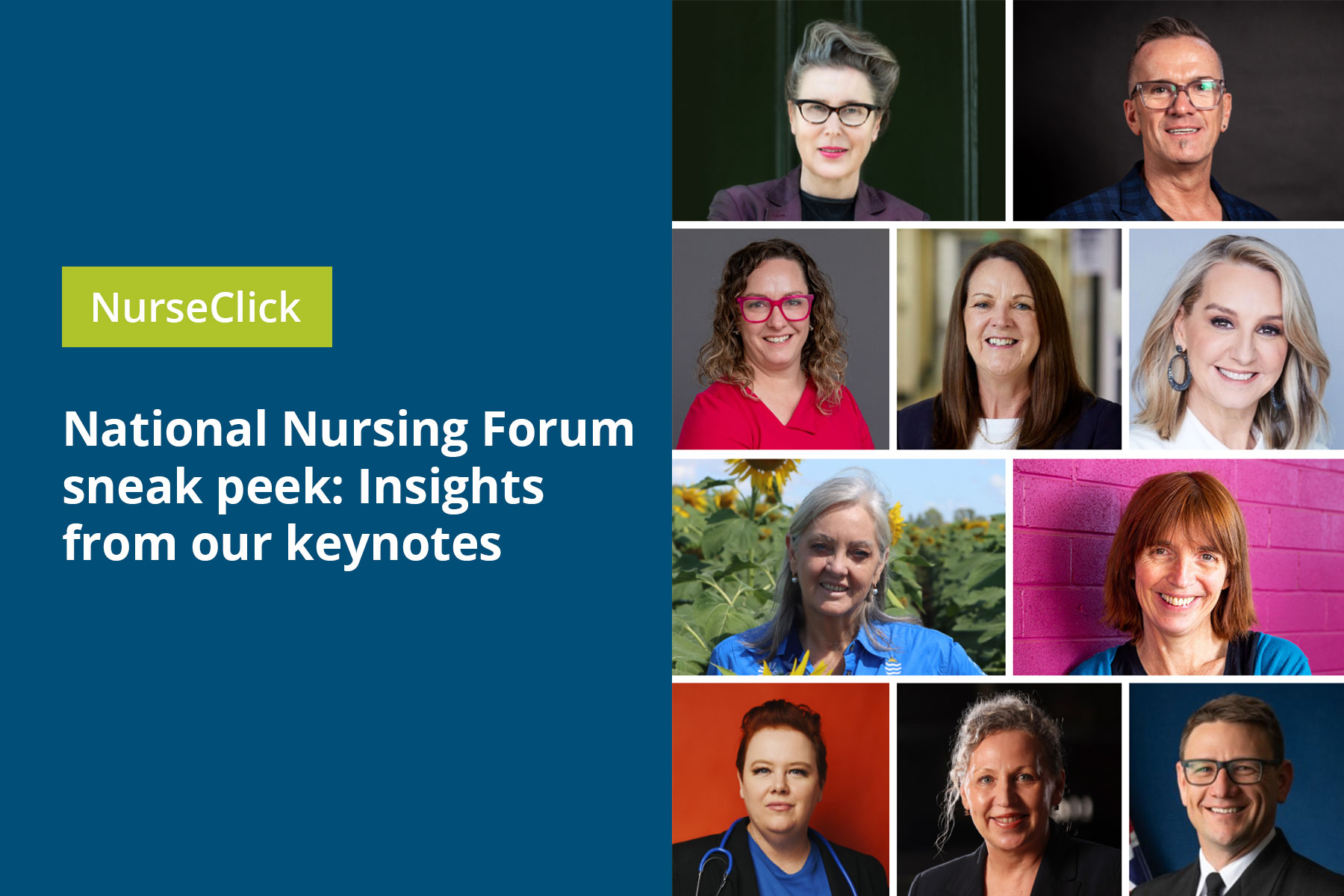This year’s National Nursing Forum (NNF) in Cairns, proudly supported by our Principal Partner, HESTA, and the Queensland Government, will feature high-profile keynote speakers whose visions for the future of nursing and health care are as diverse as their backgrounds. From senior advisors and professors to CEOs and policy advocates, these leaders will share insights on innovation and sustainability, with stories and strategies that promise to inspire and challenge.
In this article, we offer you a sneak peek of what our keynote speakers will discuss, showcasing the transformative ideas and sustainable practices they are bringing to the forefront. Explore themes such as the impactful use of data in health care, how sustainability can be integrated into everyday life, and career pivots that have led to profound insights and strategic developments.
On this page:
- What invigorating perspective or transformative idea can delegates expect to take away from your presentation?
- Reflecting on the tagline ‘Regenerate, Reinvigorate, Renew,’ can you share a pivotal moment in your career where you found inspiration and reinvented yourself?
- Given the theme of ‘sustainable solutions for our future,’ how do you personally integrate sustainability into your everyday life?
1. What invigorating perspective or transformative idea can delegates expect to take away from your presentation?

There are lessons for us from other sectors. Regardless of where we look, we are all struggling with sustainability. Perhaps we have something to share with those too! The main point is that we can only crack these grand challenges by working together and learning from each other. Leveraging the political will for investment is the first and most important step.
— Professor Dame Anne Marie Rafferty DBE FACN (Hon), Professor of Nursing Policy and former Dean of the Florence Nightingale Faculty of Nursing and Midwifery and Palliative Care at King’s College London
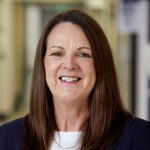
I will discuss the findings from the extensive consultation conducted in the development of the National Nursing Workforce Strategy. This involved around 6,000 stakeholders and resulted in eight key themes.
These include:
- Workforce planning
- Recruitment and retention
- Education and lifelong learning
- Models of care
- Leaders of the future
- Technology and data
- Nurse academics
- Diversity and inclusion.
— Professor Alison McMillan MACN, Commonwealth Chief Nursing and Midwifery Officer
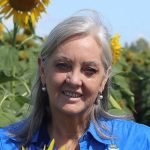
Delegates attending my presentation can expect to gain a transformative perspective on the pivotal role of nursing leadership in addressing Australia’s evolving healthcare needs. Our nursing workforce is not only highly experienced and qualified but also deeply trusted and innovative. We have consistently risen to challenges, demonstrating a remarkable tradition of responsiveness and ingenuity throughout the healthcare sector. However, we often fall short in sharing these powerful narratives.
It’s time we leverage our vast experience to drive meaningful change. Nurses have the unique capability to influence health care at every level, from local communities to the international stage. Given the current constraints on our workforce and resources, there is no quick fix on the horizon. The situation demands that we harness our collective expertise and passionate curiosity to enhance health services and outcomes.
Moreover, we must embrace our role as strong social justice advocates, particularly for underserved populations. By stepping up and actively contributing to the discourse on healthcare improvements, nurses can spearhead next-level changes. My presentation will delve into how we can utilise our extensive knowledge and leadership capabilities to navigate these challenging times and inspire positive, lasting transformations in the healthcare landscape.
— Professor Sabina Knight AM FACN, Director of JCU Central Queensland Centre for Rural and Remote Health
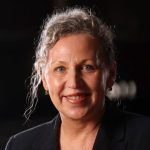
Health inequities prevail in Australia. Rural and remote communities experience more than their fair share of these inequities for access to care. However, this does not correlate to the standard of care that rural and remote communities receive from nurses. The Office of the Rural Health Commissioner aims to challenge the perspective that just because you don’t work in the ‘big smoke’ you are limited in your scope of practice and advancement in your career. In fact, I propose it is the opposite that you experience if you take on a tree change.
— Adjunct Professor Shelley Nowlan FACN, Deputy National Rural Health Commissioner
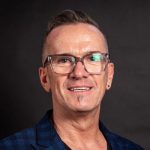
This is a great question because when one has been working in a particular field of research and practice for so many years, we begin to not see the transformative potential of the work we do and, indeed, sometimes get tired of our own voices! So, thinking about this question made me think about my core message and its persistence over 30 years of practice – that core message is and always has been, “We cannot expect nurses to provide person-centred care if we do not apply the same values to how we care for nurses”. I don’t expect that message to change anytime soon, because even with the increased focus on staff wellbeing, kindness and flourishing and greater recognition of the need for effective workplace cultures, we are a long way from sustainable person-centred cultures as a universal ideal. The commodification of nursing is of deep concern and we are in great danger of stripping away much of the essence of nursing practice (and knowledge and theory) through an endless zeal, driven towards simple quantifiable solutions to address complex practices – if we can’t fix it with an app then it is not worth doing, seems to be a dominant solution in health care these days and nurses are well and truly caught up in that drive. So, without sounding like a dinosaur at risk of extinction, I want nurses to reclaim areas of practice that require human-human connection, that require bodily engagement and that require a commitment to respect for the personhood of all persons.
— Professor Brendan McCormack MACN, Head of The Susan Wakil School of Nursing and Midwifery (inc. Sydney Nursing School) and Dean Faculty of Medicine and Health

How powerful data is and how it can and does influence the nursing workforce.
— Frances Rice MACN, Senior Nursing and Midwifery Advisor to the Commonwealth Chief Nursing and Midwifery Officer
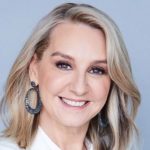
What would you tell your new graduate self if you had the chance to do so? The perspective I’ll be presenting is that of our new graduate selves: when we started nursing and what brought us to wanting to be a nurse in the first place. Remembering our joy and passion for nursing is so important to inspire the next generation of nurses, and it is our responsibility for the future of nursing, especially when things seem a bit bleak.
— Associate Professor Bernadette Eather FACN, Chief Nurse and Clinical Services Director at Ramsay Health Care

This year, we celebrate 20 years of community-controlled, nurse-assisted dialysis in Kintore, located seven hours’ drive west of Alice Springs.
Governments said it couldn’t be done. But people raised their own money and rolled their sleeves up to come up with a whole new model of care. Cultural priorities front and centre.
The story of the Purple House is an inspiring one. It has led to systemic change relevant to all remote communities and beyond that is a great example of health professionals working for community members to help them achieve their goals.
— Sarah Brown, CEO of Purple House

I’m truly looking forward to sharing more about our incredibly impactful work at OneBridge. Our dedicated outreach nurses provide health care to some of Australia’s most vulnerable citizens, and our teams strive to create health equity and immediate access through our street outreach teams, our work in social housing spaces, and in specialist homelessness community centres or youth cafes. I want to encourage Australian nurses, through my presentation, that we can often easily identify gaps in the systems and can then work towards creating solutions using evidenced-based national and global strategies. Nurses are fantastic at solving problems for community. There are lots of nursing tribes of support in this world – you are not alone!
— Adjunct Associate Professor Sonia Martin MACN, Executive Director and Founder OneBridge, ACN National Chair Street Health Faculty

The most effective leadership occurs unconsciously. My presentation muses over the power of self-awareness, intuition and subtle influence to drive sustainable change and innovation. It aims to have people reflect on their own style of leadership and art of persuasion, and ponder that perhaps they are more influential than they might think.
— Nathan Saunders FACN, Nurse Leader and Health Manager Royal Australian Navy, ACN National Chair Military Faculty
2. Reflecting on the tagline ‘Regenerate, Reinvigorate, Renew,’ can you share a pivotal moment in your career where you found inspiration and reinvented yourself?

I think the best example of that is when I switched fields from being a clinical academic to studying for my DPhil in Modern History at Oxford University. At the time it seemed like a risky decision in terms of employability. I really thought I was working my way out of the labour market. But something inside kept me going – the people around me, intellectual curiosity and the desire to cleave a different path too. Though as the only nurse and someone from a modest background (my father was a coal miner), it was lonely at times, I also felt it was important that nurses should succeed in such environments. We’ll never break the elitist path unless we dare to be different.
— Professor Dame Anne Marie Rafferty DBE FACN (Hon), Professor of Nursing Policy and former Dean of the Florence Nightingale Faculty of Nursing and Midwifery and Palliative Care at King’s College London

I’m not sure I can say I have “reinvented” myself, but while working on the COVID-19 pandemic response, I realised the incredible job aged care nurses and carers do and how, as a profession, we need to value and support this part of our workforce so much more. The reality is that there are very few areas of the health system where aged care doesn’t occur. Gerontological nursing is a specialty.
— Professor Alison McMillan MACN, Commonwealth Chief Nursing and Midwifery Officer

I vividly recall a pivotal moment in my career back in the 1980s. I found myself in an argument with a health service funder about the necessity of installing a tap for handwashing. Despite my confidence and the strong evidence I presented, I failed to secure the funding. This defeat highlighted a critical gap in my knowledge—an understanding of public health principles that could strengthen my arguments and make them incontrovertible.
This experience inspired me to pursue a master’s degree in public health. It was a decision that profoundly transformed my career. The advanced education equipped me with the tools and knowledge to articulate my positions more effectively and advocate for essential health services with greater authority.
Nurses are inherently skilled and resourceful, but this experience taught me the value of seeking additional skills to better equip ourselves for the challenges we face.
— Professor Sabina Knight AM FACN, Director of JCU Central Queensland Centre for Rural and Remote Health

Ambition to be more or give more to one’s profession and community is often a key trigger to ‘Regenerate, Reinvigorate, Renew’. Working within the Queensland Office of the Chief Nursing and Midwifery Officer in the late 2000s I was exposed to the breadth and depth of regional, rural and remote Queensland and all it has to offer. This was a moment in time when I committed to advocating for rural and remote nurses at every opportunity I had. It has led me to work across much of the state and endeavour to take on the challenging but necessary career in policy, politics and profession.
— Adjunct Professor Shelley Nowlan FACN, Deputy National Rural Health Commissioner

This week I have been engaging with our students who are about to graduate and head off into their new grad programs – one of the best parts of my job! I was sharing with them that this is my 44th year as a nurse and that I have had to reinvent myself many times. But I also shared with them the importance of my core values, drive and passions being consistent and retained during that period and how important it is for us not to ever lose those. So, in that respect, I have had many pivotal moments in my career and real ‘ah ha’ moments – these range from patients who challenged me to think differently, colleagues who engaged in profound ‘person-centred moments’ and leaders who demonstrated their ‘piracy’ by not conforming to stupid rules to bring about meaningful change. The most pivotal moment in my career, though, was when I was awarded a scholarship to undertake my DPhil at the University of Oxford. I don’t come from a background that would ever consider Oxford as a feasible reality, so ending up studying there and the personal and professional transformations that resulted have been truly life-changing.
— Professor Brendan McCormack MACN, Head of The Susan Wakil School of Nursing and Midwifery (inc. Sydney Nursing School) and Dean Faculty of Medicine and Health

I was nearly 10 years post my initial nursing qualification and was itchy to do something else. I started looking at master’s degrees but none of them were really speaking to me. Regardless, I started a Master of Nursing Management, but it didn’t really inspire me like I thought it would, especially because it was by distance education which is not a good study mode for me. I started looking for programs I could study in person and ended up landing on a Master of Business Administration (MBA) at ANU. It was daunting. I was the only person with a health background in my cohort of 30, but wherever I could, I used health/nursing as my topic. My MBA has been incredibly useful in developing skills for working in broader aspects of the health system, as well as giving me a strategic mindset, which has been instrumental in shaping the National Nursing Workforce Strategy.
— Frances Rice MACN, Senior Nursing and Midwifery Advisor to the Commonwealth Chief Nursing and Midwifery Officer

I have been so fortunate in my career that I have had many opportunities to reinvent myself. Nursing is such a wonderful profession, and I have moved from clinical practice as an ICU nurse to a ward manager, to a Divisional Director. Undertaking my Doctorate in Patient Safety, I became a patient safety specialist and went from Director of Patient Safety for NSW Health to the Head of Clinical Governance at Ramsay Health Care. COVID was a significant challenge and the ability to lead the national response for Ramsay was the most challenging and rewarding experience of my career.
— Associate Professor Bernadette Eather FACN, Chief Nurse and Clinical Services Director at Ramsay Health Care

I’ve been with Purple House for 21 years, but with so many new things, new communities, and new services that our members are excited about, it never feels stale! In fact, I have a real fear of missing out, even just coming to Cairns to talk to you mob!
— Sarah Brown, CEO of Purple House

Some people’s stories start at the beginning. My story started when I was 48 years old. At the age of 48 years, I was a Nurse Unit Manager working for Queensland Health and managing a team of clinical nurses across five hospitals in the region. I continuously saw people coming to the Emergency Depatments who were experiencing homelessness, loneliness, or needed someone to talk to. ED is great for emergencies, but not so great for these social issues. I saw people leaving the ED within the four-hour timeframe, and then re-presenting within one week to one month. At the time, six years ago, there wasn’t a lot of health support in the region I lived for people experiencing homelessness. So, I resigned from my permanent managerial role in Queensland Health to create a health service out of my car boot with my 24 years of nursing experience, and a community nursing kit. This decision changed the course of my professional career as a nurse in Australia. I was scared to take the jump, but on the other hand, I felt I had to use my skills, expertise and compassion for humanity to drive change for people experiencing homelessness in Australia. Since then, I have travelled globally through receiving the Dr Dorothea Sandars and Irene Lee Churchill Fellowship to study health access and equity for vulnerable populations around the world. This has majorly influenced my current work with the health organisation I founded: OneBridge.
— Adjunct Associate Professor Sonia Martin MACN, Executive Director and Founder OneBridge, ACN National Chair Street Health Faculty

Having a career where you change positions every two to three years requires a frequent reinvention of yourself. Whether a new team, new boss, new management, moving to a new city or interstate and breaking into new social settings. The more change you undergo, the more resilient you become, and thereby, the more adaptable and receptive to uncertainty. Of a pivotal moment, there are many over my Defence career. Though, what inspires me most is observing unlikely heroes stepping in, acting above and beyond their expected role with compassion, respect and care; they unknowingly inspire others to follow and to act.
— Nathan Saunders FACN, Nurse Leader and Health Manager Royal Australian Navy, ACN National Chair Military Faculty
3. Given the theme of ‘sustainable solutions for our future,’ how do you personally integrate sustainability into your everyday life?

Like most people, I try to recycle with care, but also campaign for better recycling facilities in my neighbourhood. There are simply not enough and I am lobbying to change that. I bike or walk in most places I can and take public transportation wherever possible. I don’t own a car. I don’t like food waste and try to minimise that too. House insulation is a problem here, and in winter, I top up on clothes rather than use energy. I try to keep active and as healthy as I can to minimise using the health system.
— Professor Dame Anne Marie Rafferty DBE FACN (Hon), Professor of Nursing Policy and former Dean of the Florence Nightingale Faculty of Nursing and Midwifery and Palliative Care at King’s College London

I try to have a minimalist mindset by reducing waste, recycling and reusing all that I can.
— Professor Alison McMillan MACN, Commonwealth Chief Nursing and Midwifery Officer

Sustainability is a principle that must be integrated into both work and personal life. It’s not a simple checklist; it’s a mindset that influences everything we do. I believe that sustainability and innovation go hand in hand. Innovation drives sustainable practices, and it’s essential to be prepared to try new approaches, even if they sometimes fail. Failure simply means we haven’t succeeded yet, but it doesn’t mean we won’t.
In our profession, sustaining ourselves is just as important as sustaining our environment. We need to be kind, care for each other, mentor, support, and inspire. We must stay committed to why we became nurses in the first place. Thinking and acting differently is crucial. One positive outcome from the COVID-19 pandemic was the increased use of virtual means to connect, reducing travel and its environmental impact.
Sustainability involves both big and small actions. It’s about considering the future—our future nursing workforce, students, carers, colleagues, children, and grandchildren—while we address the challenges of today. By focusing on sustainable practices, we can create a better future for everyone.
— Professor Sabina Knight AM FACN, Director of JCU Central Queensland Centre for Rural and Remote Health

I am going to focus on sustainability of my love for nursing. Our profession has diversity and opportunity that is not capitalised by many. Nurses as clinical experts, educators, researchers, policy officers, informaticians and managers to name a few. Personally, I integrate sustainability into my everyday professional life by being focused on mindfulness, self care but, most importantly, to consciously invest in the task of skilling, reskilling and upskilling for whatever role I have the opportunity to immerse myself in. As a nurse, you can be a chameleon: changing, camouflaging and fitting into all stages of one’s career. A reason… A season… a lifetime of nursing.
— Adjunct Professor Shelley Nowlan FACN, Deputy National Rural Health Commissioner

I try very hard to succeed at this and fail on a regular basis! Sustainability is such a huge word that operates at so many levels and in such different contexts. There are many facets to this for me. I try to be a ‘green-conscious’ person and reduce waste as much as I can but am also constantly challenged with this because of things like difficulties in avoiding single-use plastics because of busyness, expediency and lack of choice. So, to console myself and my conscience, I ensure that I do one ‘green thing’ every day. Keeping fit is really important to me and I am very conscious of the relationship between my physical fitness and my mental health – exercise just helps me be a nicer person to be around. So, because of that and the nature of my job which is highly demanding, I need to have a very early start to the day (4.30-5am) so that I can fit in some exercise and ‘me time’. So I have joined the ‘5am club’ movement. Finally, I sustain myself through the relationship I have with my husband and our children who are an amazing source of support and connection, as well as a wide network of incredible friends and colleagues who ‘get me’ – connecting with them usually involves great food and wine … another reason why I need to exercise!
— Professor Brendan McCormack MACN, Head of The Susan Wakil School of Nursing and Midwifery (inc. Sydney Nursing School) and Dean Faculty of Medicine and Health

I try my hardest to follow the 7 R’s of recycling (Reduce, Reuse, Recycle, Refuse, Repair, Re-Gift and Recover). I am eagerly awaiting the return of soft plastic recycling, much of my wardrobe is now 2nd hand or non-fast fashion. I’m even working on making my dog as sustainable as possible with compostable waste bags for when we are out and a dedicated composter for at home!
— Frances Rice MACN, Senior Nursing and Midwifery Advisor to the Commonwealth Chief Nursing and Midwifery Officer

Before she died in 2022, my sister was an Environmental Scientist. She was an environmentalist, climate change advocate and sustainability champion long before it was part of our mainstream conversation. Her fierce passion for waste management was something not to trifle with and was drilled into us all. As a result, I am incredibly diligent with recycling, not just paper, glass and plastics, but buying sustainable products and minimising waste. She died of melanoma at 56, and because of her, I’m also diligent with sun protection and encouraging others to protect themselves, so please slip, slop, slap, wrap! (That’s slip on a shirt, slap on sunscreen, slap on a hat and wrap on some sunnies, for those of you too young to remember the campaign).
— Associate Professor Bernadette Eather FACN, Chief Nurse and Clinical Services Director at Ramsay Health Care

I try to tread lightly on the planet: I don’t eat meat, I have solar panels (my middle son is an electrician!), and I hate shopping, so I don’t consume a lot. My car, however, is a Morris Minor and is 65 years old, so I am sure I am probably emitting (But she doesn’t go far!) At work, we have electric vehicles and water recycling and our bosses out bush spend a lot of time looking after the country. Remind me to tell you the pussy cat story when I see you!
— Sarah Brown, CEO of Purple House

As an incredibly driven human being I need to be sustainable. I have practices such as being kind to myself in tough times, meditating to be present, recognising the massive amounts of abundance I have in my life simply by acknowledging my basic yet beautiful ability to breathe and exist peacefully, taking time off work, working in a passionate space, and by having a beautiful and varied tribe of humans surrounding me who value my presence. All my sustainability practices are incredibly simple. They need to be because my professional life is very dynamic! I also love sharing my passion and knowledge as a way to create sustainability in Australia with the nursing profession. I believe in the strength of our nurses and the incredibly impactful work they do for humanity.
— Adjunct Associate Professor Sonia Martin MACN, Executive Director and Founder OneBridge, ACN National Chair Street Health Faculty

I think of this in the context of sustaining myself, so that I can manage work and life pressures and keep the scales balanced between ‘musts’ and ‘wants’. We need to work in an ever-demanding environment and still be there for our families, friends, colleagues, and the people we care for. But we need to look after ourselves first so that we can sustain this. Don’t feel guilty about indulging in the stuff that ‘fills your cup’ and make it a habit to indulge in your own health. I am six lessons into my new mindfulness endeavour: ballroom dancing! There is no space left with the cognitive load it places on me, with the side benefit of fitness. I’ll let you know how it goes….
— Nathan Saunders FACN, Nurse Leader and Health Manager Royal Australian Navy, ACN National Chair Military Faculty
Don’t miss the opportunity to be part of these crucial conversations at the National Nursing Forum. Register now to connect with like-minded colleagues in Cairns and gain firsthand insights from our inspirational speakers. The NNF is not only a chance to learn from the best but also a unique platform to network with peers and discuss solutions that will drive the future of nursing. Secure your spot today and be a part of shaping a sustainable and innovative future for our profession.

